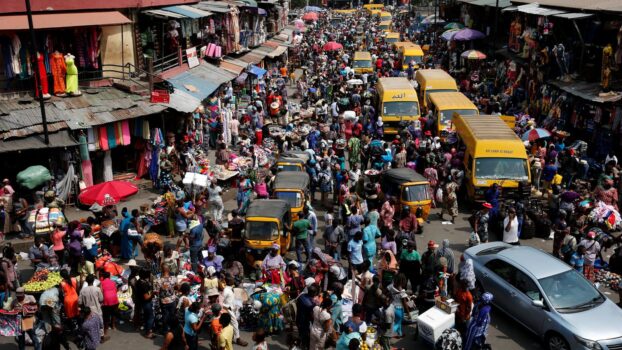 In February 2024, Nigeria experienced a significant spike in headline inflation, soaring to 31.70% compared to 29.90% in January 2024, marking a notable increase of 1.80%. This surge, as reported by the National Bureau of Statistics, reflects a rapid acceleration in the pace of price rises across various sectors.
In February 2024, Nigeria experienced a significant spike in headline inflation, soaring to 31.70% compared to 29.90% in January 2024, marking a notable increase of 1.80%. This surge, as reported by the National Bureau of Statistics, reflects a rapid acceleration in the pace of price rises across various sectors.
On an annual basis, the inflation rate for February 2024 was 9.79% higher than the 21.91% recorded in the same period of 2023, indicating persistent inflationary pressures on the Nigerian economy.
Food inflation escalated to 37.92% in February 2024, primarily driven by surging prices of essential items such as bread and cereals, potatoes, yams, fish, coffee, tea, and cocoa. This represents a substantial 13.57% increase from February 2023’s food inflation rate of 24.35%.
On a month-to-month basis, food inflation in February 2024 climbed to 3.79%, indicating a 0.58% rise from January 2024’s rate of 3.21%. This accelerated price growth underscores concerns over food affordability and accessibility for Nigerian households.
Core inflation, excluding volatile agricultural products and energy costs, surged to 25.13% in February 2024, reflecting notable price increases in sectors such as passenger road transport, housing rentals, medical services, and pharmaceutical products. This marks a significant 6.76% increase from February 2023’s core inflation rate of 18.37%.
Month-on-month, core inflation slightly decreased to 2.17% in February 2024 from 2.24% in January 2024, suggesting some moderation in non-food, non-energy price pressures.
In urban areas, the inflation rate soared to 33.66% year-on-year in February 2024, a substantial increase of 10.87 percentage points from February 2023’s rate of 22.78%. Similarly, rural areas experienced a surge in inflation, reaching 29.99% year-on-year in February 2024, an increase of 8.89 percentage points from February 2023’s rate of 21.10%.
Month-on-month, urban and rural inflation rates rose to 3.17% and 3.07% in February 2024, respectively, indicating widespread and accelerating price pressures across both urban and rural regions of the country.

INEC Rejects Petition To Recall Senator Natasha Akpoti-Uduaghan
President Tinubu Set To Depart For Two-Week Working Visit To Paris
Tinubu Reconstitutes NNPC Board, Appoints New Leadership
DSS Arrests Two Key Suspects In Edo Traveller Killings